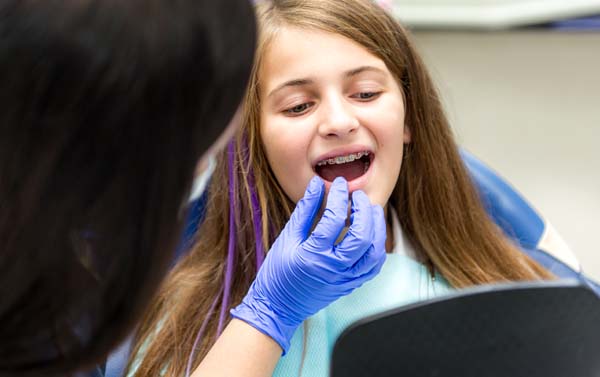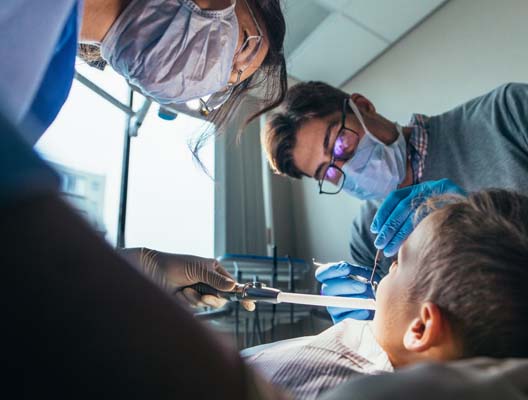What is a Good Age for Early Orthodontic Treatment?

Early orthodontic treatment is a great way to get ahead of oral issues that could become worse over the course of a child's life. Bite issues, crowded teeth or jaw malfunction can all contribute to the development of gum disease and cavities over time, which are issues that could require in-depth treatment. However, with early orthodontic care, children will be set up for a lifetime of good oral health.
Most parents who are told their child needs early treatment wonder how old their child should be before they begin treatment. Each child is different, which means treatments may vary. However, for the most part, there are a few general guidelines that orthodontist follow in early orthodontics.
Early orthodontic treatment
Below is an overview of early orthodontic treatment, including what it is and at what age it should start. This information can be especially helpful for parents who are currently navigating through the orthodontic process.
Defining early orthodontic treatment
Early orthodontic treatments are preventive and interceptive measures taken to ensure the healthy development of the oral cavity. The practices themselves are similar to traditional orthodontics; however, treatment starts much earlier and requires more monitoring from the orthodontist. The most common methods of early orthodontic treatment include fixed braces, removable retainers, tooth extraction and headgear.
When should treatment start?
Early orthodontic treatment typically starts between the ages of six and eight. Generally speaking, orthodontists will evaluate children once they start to lose baby teeth. During the evaluation, if there are any warning signs, the orthodontist may recommend early treatment. While an evaluation may be done even earlier, treatment is not likely to begin until some of the child's adult teeth have erupted. The newly erupting adult teeth are used as a guide for those that have not erupted yet.
In some cases, age does not matter. Instead, the condition of the oral cavity is used to determine if early treatment is necessary. Outlined below are a few signs that may indicate a child should begin early orthodontic treatment in the near future.
- an underdeveloped or narrow jaw
- crossbite, underbite or overbite
- crooked erupting adult teeth
- crowding of baby and/or adult teeth
Each child is different, meaning their needs may vary. Some children may need early orthodontic treatment for an extended period of time, which can last a few years. In other scenarios, early orthodontic treatment may only be needed for a few months in order to lay the groundwork for traditional treatment.
Other things to note
When parents are considering early orthodontic treatment, it can be intimidating, especially for children as young as six or seven years old. However, it is important to know that treatment often offers many long-term benefits. Ultimately, it saves the child's mouth from developing poorly, which can cause serious problems later.
Find out more
When looking to learn more about the early orthodontic treatment process, it is best to consult directly with an orthodontist. An evaluation can be done in order to determine the most appropriate course of action. Additionally, questions and concerns can be adequately addressed. Reach out today to get started or to find out more.
Request an appointment here: https://www.myhawthorneorthodontist.com or call Hawthorne Orthodontics at (310) 921-8333 for an appointment in our Lawndale office.
Check out what others are saying about our dental services on Yelp: Early Orthodontic Treatment in Lawndale, CA.
Recent Posts
A pediatric dentist works with your child to treat their condition and teach them the importance of oral health from a young age. Misalignment and malocclusions are quite common in children and adolescents as their teeth develop. There are several reasons a child might require braces. Treating these conditions early on can help guide their…
Even though braces are common among teenagers, getting them is a new orthodontic experience for every patient. Teens and their parents tend to have many questions about braces and other orthodontic treatments for teens, when to get braces, and what having braces will be like. Here are some of the most common questions orthodontists hear…
Generally, a retainer is the last vital stage of orthodontic treatment. The appliance, made from metal and plastic, is personalized for each patient to fit perfectly into the wearer’s mouth. After braces or other orthodontic devices have corrected the alignment of the teeth, the retainer functions to stop them from shifting back to their previous…
Invisalign® is a common type of invisible braces that is developed by Align Technology. Many dentists around the world have used this treatment to fix dental problems. Invisalign is basically a removable orthodontic appliance. It is often offered as an alternative to traditional solutions. It is a good option for people who want a less…


